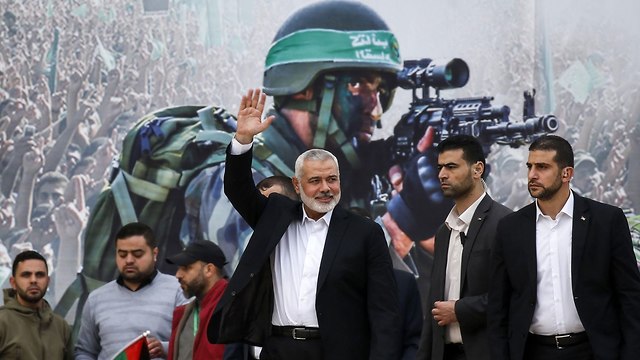The Palestinians are closely following the Israeli elections campaign. Every tweet about Benny Gantz’s silence or the latest poll on how many seats Orly Levy’s part is expected to get is quickly translated into Arabic. There is a longstanding tradition of interest in the game of Israeli democracy, but also serves as tactical intelligence — they understand that the elections affect how Prime Minister Benjamin Netanyahu responds to security related events. The tension between Hamas and Israel is no longer only a matter of security policy but one at the center of the elections campaign.
The Palestinians are currently in the midst of their own internal political struggle that has peaked recently. Mahmoud Abbas is sick of funding the Hamas regime in Gaza and he decided on a one-sided disengagement; apparently he learned from Ariel Sharon.
Foreign aid to the Palestinian Authority, so crucial to its budget, has decreased in recent years and the funds entering Gaza fall into a budgetary and demographic black hole which doesn’t help much. Eleven years after Hamas forcefully took over the Gaza Strip, in the face of Israel’s right wing government, an American administration uninterested in the Palestinian issue and Arab leaders who openly flirt with Netanyahu, Abbas has decided to unleash his frustration on poor, beaten Gaza and formally disengage from it, especially economically.In Israel, the Palestinian issue, once at the center of the political dialogue, has disappeared from public discourse, largely due to the lack of a Palestinian partner. The Israeli left is struggling to fill that vacuum. No alternative has yet been found to the two-state principle which has lost its relevancy.
The situation among the Palestinians is similar. Very few Palestinian political figures have the courage to loudly declare in Arabic that they believe in two states. The map of Palestine is the same map both in the Hamas schools of Gaza and those of Fatah in the West Bank. Both pay compensation to those who commit terror attacks against Israelis. The issue isn’t about substance but rather tactics: how to operate vis-à-vis Israel on the path to liberate Palestine. Absurdly enough, at a time when a Palestinian state seems further than ever and Hamas is seeking a long term ceasefire with Israel (hudna) based on 1967 borders, the feud between Hamas and Fatah is stronger than ever. As of now, the root of the rift among the Palestinian people is related to matters of religious and political identity (Muslim brothers versus others) and struggles over territory, money and power. Netanyahu assumed that he would be able to buy quiet until the elections with the Qatari funds entering Gaza. But the Palestinian arena is restless. Unlike our officers, Hamas commander Yahya Sinwar knows his enemy, speaks its language and does not require a translator to understand the latest cabinet leak. He knows that if Netanyahu expended so much energy to avoid a military campaign in Gaza then he apparently must have a good reason. In the past, whenever Abbas pressured Hamas they would vent at Israel. Signs of discontent have been noticeable in recent days. The $15 million in Qatari funds is being delayed, as a punishment of sorts, but Abbas can go further and slash the $100 million the PA sends to Gaza every month. The question remains whether April 9th will arrive without stopping for a military campaign on the way. Every week is another challenge. Abbas can cause Gaza to explode before the elections : http://bit.ly/2sfNGQD

No comments:
Post a Comment